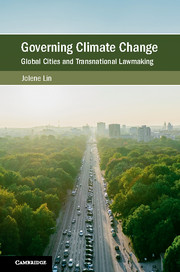Book contents
- Governing Climate Change
- Cambridge Studies on Environment, Energy and Natural Resources Governance
- Governing Climate Change
- Copyright page
- Contents
- Acknowledgements
- Abbreviations
- 1 Global Cities, Climate Change, and Transnational Lawmaking
- 2 Theoretical Framework
- 3 The Rise of the City in International Affairs
- 4 City Action on Climate Change
- 5 Transnational Urban Climate Governance via Networks: The Case of C40
- 6 Cities as Transnational Lawmakers
- 7 A Normative Assessment of Urban Climate Law
- 8 Conclusion
- Select Bibliography
- Index
6 - Cities as Transnational Lawmakers
Published online by Cambridge University Press: 04 June 2018
- Governing Climate Change
- Cambridge Studies on Environment, Energy and Natural Resources Governance
- Governing Climate Change
- Copyright page
- Contents
- Acknowledgements
- Abbreviations
- 1 Global Cities, Climate Change, and Transnational Lawmaking
- 2 Theoretical Framework
- 3 The Rise of the City in International Affairs
- 4 City Action on Climate Change
- 5 Transnational Urban Climate Governance via Networks: The Case of C40
- 6 Cities as Transnational Lawmakers
- 7 A Normative Assessment of Urban Climate Law
- 8 Conclusion
- Select Bibliography
- Index
Summary
INTRODUCTION
A key theme that has emerged from the foregoing discussion is that global cities are sites of innovative climate governance. Importantly, global cities are not just aiming to reduce GHG emissions locally. In line with the emerging trend of cities playing an increasingly visible role in international affairs, global cities aim to scale up their climate actions to generate worldwide impact and play a role in governing climate change at the global level. This has led to the formation of numerous city networks, of which the most prominent transnational network of global cities focusing on climate action is C40. Through reiterative interaction and frequent cooperation within their network, global cities develop and internalize certain norms, defined as rules that set ‘a standard of appropriate behaviour for actors with a given identity’ and are imbued with a quality of ‘oughtness’ that sets them apart from other kinds of rules.
In the present case, the norms are as follows: first, that climate change is a global problem but can and must be addressed locally by cities; second, that large, global cities are not only a source of the problem because of their high levels of GHG emissions but also a source of solutions; third, that cities can best reduce their GHG emissions and embark on low-carbon growth by committing to a policy approach based on measurement, monitoring, and reporting of their GHG emissions. Based on this normative foundation, global cities have cooperated (through C40) with other actors such as GHG accounting consultancies, development banks, and civil society to develop practices and voluntary standards to enable global cities to reduce their GHG emissions in the short term and make the transition towards low-carbon development in the longer term. I refer to these norms, practices, and voluntary standards developed by global cities and implemented through their transnational networks as urban climate law.
Urban climate law is notable in at least three respects. From the viewpoint of environmental effectiveness and fulfilling one of the key objectives of the transnational climate change regime complex (i.e. climate mitigation), urban climate law can make an important contribution towards reducing cities’ GHG emissions, which constitute a sizeable share of global emissions (estimated to be 37–49 per cent).
- Type
- Chapter
- Information
- Governing Climate ChangeGlobal Cities and Transnational Lawmaking, pp. 127 - 159Publisher: Cambridge University PressPrint publication year: 2018

